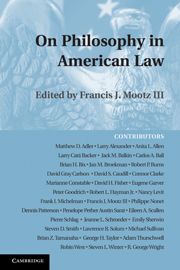Book contents
- Frontmatter
- Contents
- Introduction
- PART I KARL LLEWELLYN AND THE COURSE OF PHILOSOPHY IN AMERICAN LAW
- PART II PHILOSOPHICAL PERSPECTIVES ON LAW
- PART III AREAS OF PHILOSOPHY AND THEIR RELATIONSHIP TO LAW
- PART IV PHILOSOPHICAL EXAMINATIONS OF LEGAL ISSUES
- PART V LAW, RHETORIC, AND PRACTICE THEORY
- PART VI QUESTIONING THE RELATIONSHIP BETWEEN PHILOSOPHY AND AMERICAN LAW
- 28 Law and Philosophy at Odds
- 29 Jurisprudence: Beyond Extinction?
- 30 Law and Philosophy in the Hyperreal
- 31 Philosophy? In American Law?
- PART VII COMMENTARIES
- Contributors and Selected Bibliography
- Name Index
31 - Philosophy? In American Law?
Published online by Cambridge University Press: 31 July 2009
- Frontmatter
- Contents
- Introduction
- PART I KARL LLEWELLYN AND THE COURSE OF PHILOSOPHY IN AMERICAN LAW
- PART II PHILOSOPHICAL PERSPECTIVES ON LAW
- PART III AREAS OF PHILOSOPHY AND THEIR RELATIONSHIP TO LAW
- PART IV PHILOSOPHICAL EXAMINATIONS OF LEGAL ISSUES
- PART V LAW, RHETORIC, AND PRACTICE THEORY
- PART VI QUESTIONING THE RELATIONSHIP BETWEEN PHILOSOPHY AND AMERICAN LAW
- 28 Law and Philosophy at Odds
- 29 Jurisprudence: Beyond Extinction?
- 30 Law and Philosophy in the Hyperreal
- 31 Philosophy? In American Law?
- PART VII COMMENTARIES
- Contributors and Selected Bibliography
- Name Index
Summary
1. Perhaps indeed “philosophy” consists of “theories,” the words of which matter less than their “life-in-action,” a life they gain insofar as they “serve men's needs.” The chief questions regarding “philosophies-in-action” are then: “What needs they serve – and whose.”
Talk of such “philosophies” is at bottom nothing but a piece of journalism. Perhaps we should call it gossip. It is now abundant at law, ad nauseam, in law practice, where it may well have become indispensable, as well as in legal “education,” where it often peddles itself under the nearly transparent disguise of the so-called “sciences of man.”
To be more precise, one would have to say, not that this vulgarity has found its place “in law,” but rather that law has become immersed in it, having now lost almost all traces of the splendid isolation with which legal institutions were once able to maintain a certain aura of nobility. Vulgarity belongs of necessity to the vulgum pecus.
Needless to say, no self-respecting mind will occupy itself with such matters. That is a straightforward and quite easy rule of intellectual hygiene. Let “philosophies-in-action” be the business of newspaper readers and other Llewellyns of this world. We shall find our “philosophy” somewhere else. More questionable than ever is now the question whether any honorable mind can still destine itself to law.
But perhaps we should not let the sense of the phrase “philosophy in American law” be determined by the way Llewellyn used it. What else might it say?
- Type
- Chapter
- Information
- On Philosophy in American Law , pp. 265 - 270Publisher: Cambridge University PressPrint publication year: 2009



